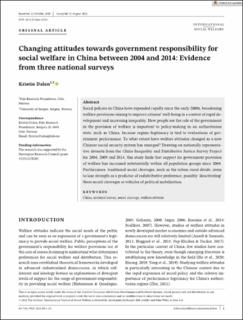| dc.contributor.author | Dalen, Kristin | |
| dc.date.accessioned | 2022-02-16T08:35:59Z | |
| dc.date.available | 2022-02-16T08:35:59Z | |
| dc.date.created | 2022-02-15T09:23:20Z | |
| dc.date.issued | 2021 | |
| dc.identifier.issn | 1369-6866 | |
| dc.identifier.uri | https://hdl.handle.net/11250/2979266 | |
| dc.description.abstract | Social policies in China have expanded rapidly since the early 2000s, broadening welfare provisions aiming to improve citizens’ well-being in a context of rapid development and increasing inequality. How people see the role of the government in the provision of welfare is important to policy-making in an authoritarianstate, such as China, because regime legitimacy is tied to evaluations of government performance. To what extent have welfare attitudes changed as a new Chinese social security system has emerged? Drawing on nationally representative datasets from the China Inequality and Distributive Justice Survey Project for 2004, 2009 and 2014, this study finds that support for government provision of welfare has increased substantially within all population groups since 2004. Furthermore, traditional social cleavages, such as the urban–rural divide, seem to lose strength as a predictor of redistributive preference, possibly ‘deactivating’ these social cleavages as vehicles of political mobilisation. | |
| dc.language.iso | eng | |
| dc.title | Changing Attitudes towards Government Responsibility for Social Welfare in China between 2004-2014: Evidence from Three National Surveys | |
| dc.type | Others | |
| dc.description.version | acceptedVersion | |
| cristin.ispublished | true | |
| cristin.fulltext | postprint | |
| cristin.qualitycode | 2 | |
| dc.identifier.cristin | 2001636 | |
| dc.source.journal | International Journal of Social Welfare | |
| dc.relation.project | Norges forskningsråd: 225132 | |
| dc.subject.nsi | VDP::Sammenlignende politikk: 241 | |
| dc.subject.nsi | VDP::Comparative politics: 241 | |
